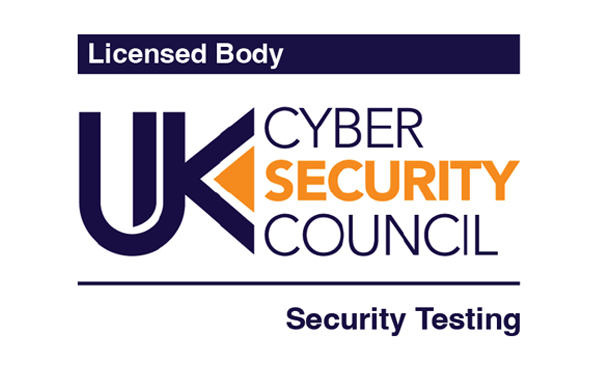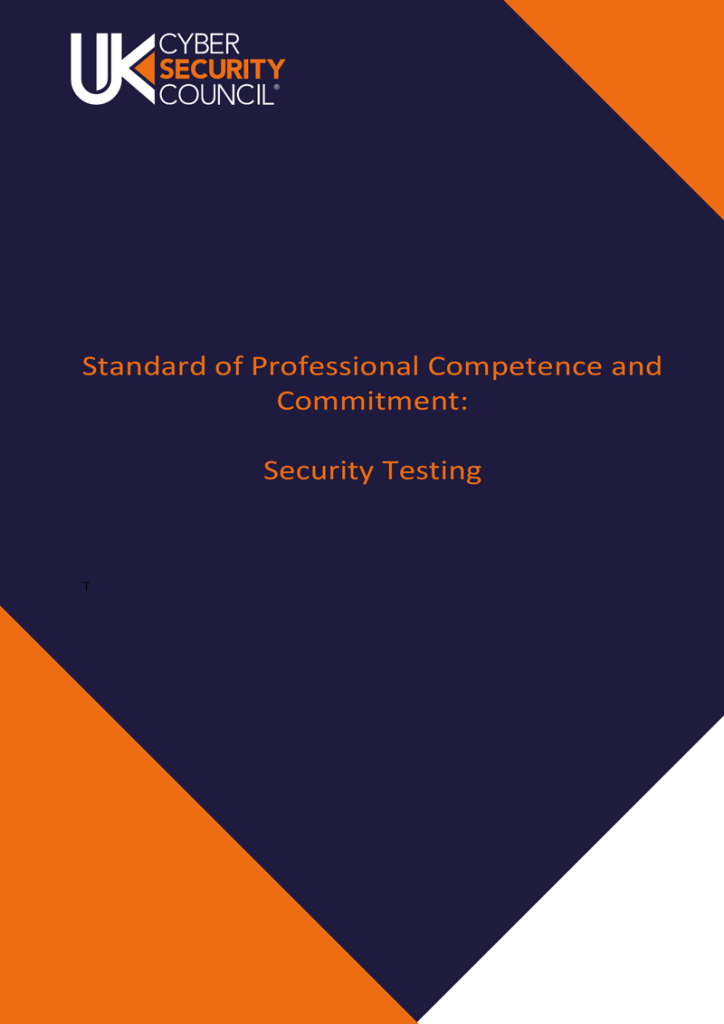

Our information supports and is informed by the UK Cyber Security Council. Developments are ongoing and some content on this website may be subject to change as a result. Please get in touch if you have any questions.
Please click here to be taken to The Council’s website.
Application Guidance for Professional Registration - Security Testing Specialism
There are three professional registration titles aligned to the Council’s professional standard. Click on the tabs below for information. Please note applications at Associate Level are not yet open and are subject to further research.
An Associate title is awarded to a cyber professional who understands the fundamentals of cyber security and can evidence applying these fundamentals in their career to date.
The Associate Level of security testing is the first grade of membership in the cyber security chartership scheme.
An Associate Cyber Security Professional has practical experience in cyber security and will be a practitioner operating at a level at which their professional expertise is being used effectively in their role.
An Associate cyber security tester would not be expected to have more than a passing knowledge of any of the additional technical knowledge areas.
An ACSP must be able to demonstrate that they are working at the associate level by meeting the following criteria:
- Be able to demonstrate their knowledge, understanding and experience relating to their role, some understanding of cyber security in its wider sense, and should be able to demonstrate practical experience within their career.
- Be able to demonstrate that they have reasonable communication and interpersonal skills.
- Be able to demonstrate that they understand the need to develop management skills and have carried out some supervisory activity within a cyber security environment.
- Be able to demonstrate that they understand and apply integrity, morals, and ethical values.
- Be able to demonstrate that they carry out and plan for continued development of themselves and the cyber security profession.
A Principal title is awarded to an established cyber professional who plays an active part in the profession and can demonstrate practical contributions to cyber engagements whilst not necessarily leading them.
A Principal Cyber Security Tester is expected to be involved in larger and/or more complex security tests or lead engagements. They may take on more responsibility in terms of team leadership, they may buddy or mentor junior cyber security testing professionals, and/or have one or more technical specialists within the realm of security testing (e.g., network / infra / cloud / web apps / DevSecOps / IT / OT, etc) where they are considered an ‘expert’.
Building on the competencies for Associate, they should therefore:
- Be able to demonstrate a good understanding of the lifecycle of different types and complexities of engagement.
- Be able to define and describe the scope and objectives of a security test for a large and/or complex environment.
- Have a good understanding of the common legal and regulatory frameworks relevant to security and IT environments and should have an excellent knowledge of the framework/s relevant to their specialism.
- Have a good understanding of business risk as it applies to security weaknesses and controls.
- Be able to demonstrate the ability to create appropriate test platforms for different types and complexities of test, including their own specialism and at least one other.
- Be able to keep clear, concise, and accurate records of their test activities including descriptions of the repeatability of a finding, and how to classify findings.
- Be able to determine whether a finding is sufficiently critical to warrant notification to the client immediately, at the end of day, or in the final report; and to demonstrate clear, concise, and accurate reporting in the final report.
- Be able to present findings to senior management (i.e., CISO) comfortably.
A Chartered title is awarded to an established Cyber professional who can evidence leadership in cyber engagements whilst playing an active role in the wider profession and has knowledge of related specialisms.
A Chartered Cyber Security Professional will have significant practical knowledge in several Specialisms, though should have a particular Specialism at which they are an acknowledged expert. As such, they should be operating at a level where their professional opinion may reasonably be sought to contribute to the development of the overall cyber security profession.
Building on the competencies for Principal, they should therefore be expected to:
- Demonstrate an excellent understanding of the lifecycle of all types and complexities of engagement, including techniques for influencing a client through articulation of the benefits of cyber security testing.
- Be able to define and describe the scope and objectives of any security testing engagement, including large and complex tests involving multiple environments and technologies.
- Have a thorough knowledge of the common legal and regulatory frameworks relevant to security and IT environments and should have an excellent knowledge of the framework/s relevant to their specialism/s.
- Have a thorough understanding of the risks involved in testing, and of the business risks related to findings and their mitigations.
- Demonstrate a thorough understanding of the setup of multiple test platforms, including within team-based testing, and the need for all hardware, cabling, software, licensing, sandboxes, and sanitisation.
- Demonstrate a thorough understanding of the importance of clear, concise, and accurate records of all aspects of a test and ensure that quality of record keeping is maintained by the test team.
- Be able to determine whether a finding is sufficiently critical to warrant notification to the client immediately, at the end of day, or in the final report; and to demonstrate clear, concise and accurate reporting in the final report; to be able to convey clearly to the client (who may be non-technical) what any finding means in terms of their security posture and exposure to risk, and possible methods of mitigation
- Be able to present at Board level technical findings and assessment thematic comfortably.
A Chartered Cyber Security Professional will be able to demonstrate competence and commitment in all the areas below and provide appropriate evidence.
A: Knowledge, Understanding & Experience
B: Communication & Interpersonal Skills
C: Collaborative Management, Leadership & Mentoring
D: Integrity
E: Personal Commitment
More information on the requirements expected of candidates for each Registered Title can be found in the documents below; please ensure you have read these prior to applying.
Requirements & Expected Equivalencies
|
Associate (PCSP)
|
Principal (PCSP)
|
Chartered (ChCSP)
|
|---|---|---|
|
SFIA Level 3
|
SFIA Level 5
|
SFIA Level 6
|
|
CiiSEC Skills Framework Level 3
|
CiiSEC Skills Framework Level 5
|
CiiSEC Skills Framework Level 6
|
|
NICE Cybersecurity Workforce Framework - Entry
|
NICE Cybersecurity Workforce Framework – Intermediate
|
NICE Cybersecurity Workforce Framework – Advanced
|
The Pathway to Chartered Status
There are three stages to becoming chartered: the application form, exam, and interview.
The route to chartership is not a tick box exercise; it is a rigorous process to recognise achievement and excellence within the industry.
The application form is the initial stage of your route to chartership. The form is detailed; please see below advice and guidance on filling it in to give you the best chance of success.
We recommend following the STAR technique, a proven method of answering tricky situational questions systematically while providing all the essential details.
The STAR technique is a method of answering questions that is comprised of four steps:
Situation: Describe the situation and when it took place.
Task: Explain the task and what was the goal.
Action: Provide details about the action you took to attain this.
Result: Conclude with the result of your action.
We have provided some examples of what we are looking for as evidence that candidates have relevant experience mapped to the competencies in the standard – these are contextualised for the Security Testing specialism. This is not a definitive list, but may be helpful in determining whether you are ready to apply.
Please click below to be taken to the examples, and the evidence required.
Application Form
Professional History
You are expected to cover your complete professional history as well as your current work in industry. Start with your most recent post and work backwards over a 10-year period. Mention your individual achievements, tasks, and actions, talk about yourself rather than team efforts.
- Indicate the size and complexity of any projects or tasks you describe
- Give an extended description of your current role
- Explain any acronyms or abbreviations the first time you use them.
Education History
The application form also asks for your education history, such as professional qualifications, apprenticeships, and degrees.
Additional information required
You will be given the opportunity to detail any papers you have contributed to; this can include articles published in recognised journals, in-house publications, conference and seminar presentations, and any other contribution to industry, national and international bodies.
You are then asked to provide evidence of your competence mapped to the Standard of Professional Competence & Commitment (UK CSC SPCC). Using the STAR model will also prove beneficial here.
Finally, you will also be asked to provide at least two referees; professionals who are familiar with your technical knowledge and work-based experience.
Once your application has been approved your pathway will follow one of two routes:
- Exam and interview (viva) or
- Interview only (if you have completed an appropriate exam within the last three years).
Depending on which category of chartership you are applying for, different exams map to the required skill level. The CHECK Scheme examination standard has been mapped against the UK Cyber Security Council Standard for Professional Competence and Commitment (UKCSC SPCC) and approved as a means of testing technical knowledge requirements.
For registrants applying through The Cyber Scheme, this means:
- For Chartered Title, applicants are required to pass or hold The Cyber Scheme’s CSTL exam (App or Inf), or equivalent exams from other organisations, and be able to demonstrate significant delivery experience at Team Leader level to proceed with their application. Certification must be valid for a minimum of 12 months from application date.
- For Principal Title applications, registrants are required to pass or hold The Cyber Scheme’s CSTL exam (App or Inf), or equivalent exams from other organisations. Certification must be valid for a minimum of 12 months from application date.
- The Associate Title will most likely map to The Cyber Scheme’s Foundation exam (CSFL), however this is still in development so please get in touch if you’d like to know more about applying at this level.
Existing CTM or CTL certificate holders
If you hold current Team Member or Team Leader qualifications (valid for at least 12 months at time of application) and wish to obtain professional recognition, you will only be required to completed the application form and attend a remote interview.
You won’t need to re-sit your existing certification in order to apply for a professional title.
Interview
The interview will be conducted by Chartered Assessors at or above the level of Chartership being assessed. The 90 minute interview is your opportunity to give evidence that you meet the expected level of competence against the 18 criteria in the standard, based on your application form.
Interviews will take place remotely.
Final Assessment
Following the application, examination and interview, a Final Assessment review will take place before Professional Registration can be awarded. The Final Assessment Assessors are responsible for holistically reviewing all the evidence from each stage and will take recommendations from assessors and interviewers as necessary.
Ready to apply? Please click below for the step-by-step process and a downloadable application form.
"It is recommended you provide plenty of detail as to why you should be chartered, showing evidence of your skills and competencies wherever possible".
Andrew Jones, Strategy Director, The Cyber Scheme







